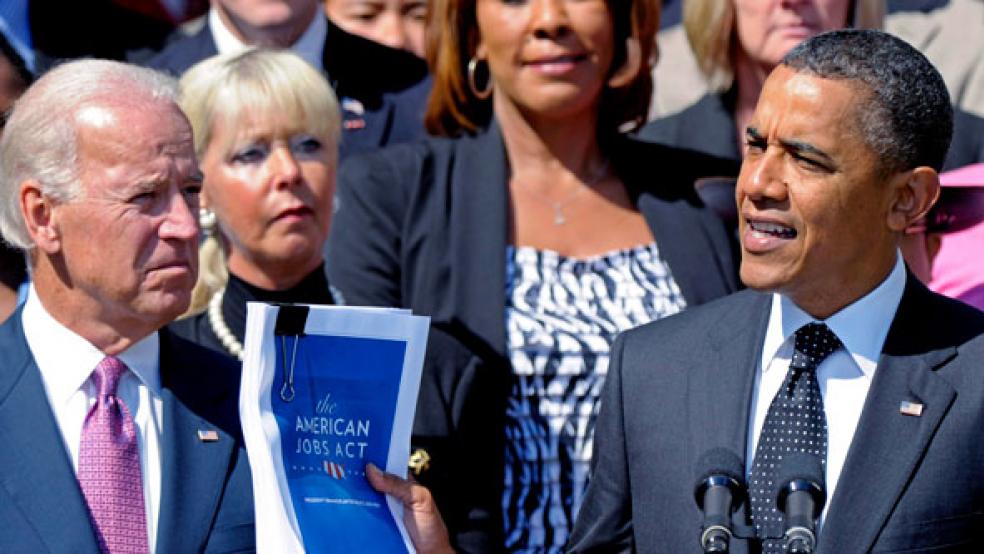Barely 24 hours have passed since the Obama administration announced a plan to pay for its $447 billion jobs bill, and already the battle lines have been drawn between the White House and Congressional Republicans and special-interest groups, who say such stiff tax increases will erase any job growth the program might have spurred.
According to the plan White House Budget Director Jack Lew unveiled yesterday, the bulk of the revenue to pay for the jobs plan—or $400 billion-- would come from a cap on itemized deductions for individuals earning more than $200,000 a year or couples earning more than $250,000 a year. That means Americans in the 33 and 35 percent tax brackets would get smaller tax breaks on their mortgage interest, charitable contributions, and state taxes. The oil and gas industry would lose $40 billion in tax breaks from deductions for drilling, and companies that deduct corporate jet expenses would lose $3 billion in benefits. The share of investment profits that managers of hedge funds, venture capital firms, and real estate partnerships receive would be taxed at a top rate of 35 percent instead of the current 15 percent capital gains rate, which could raise up to $18 billion in revenue. None of the tax increases would take effect until 2013.
“It would be fair to say this tax increase on job creators is the kind of proposal both parties have opposed in the past,” said Michael Steel, a spokesman for House Speaker John Boehner. "We remain eager to work together on ways to support job growth, but this proposal doesn't appear to have been offered in that bipartisan spirit." All the proposed revenue increases have been shot down by Congress at different points since 2007. They were included more generally in Obama’s 2012 budget proposal.
The oil and gas industry, housing industry, and charitable services sector are among those lining up to argue that these tax increases will endanger hundreds of thousands of jobs. They would result in the slashing of 200,000 jobs in the oil and gas industry said John Felmy, chief economist at the American Petroleum Institute. “It will be a terrible hit to an industry this country needs dearly to drive up revenue, jobs and energy security.”
Nonprofit groups originally cheered Obama’s jobs plan because they would get a payroll-tax cut along with private-sector employers. But that changed when the tax increases were proposed. “The very organizations who could benefit from these kind of payroll-tax breaks would have less money available to create jobs because the donors we rely on are incentivized to give less,” said Diana Aviv, President and CEO of Independent Sector, a lobbying coalition for nonprofit groups. “Talk about cutting off your nose to spite your face.”
But tax experts who spoke with The Fiscal Times say that though the proposed tax increases would suck some money out of the economy come 2013, next year could provide enough of a grace period for stimulus measures like the payroll tax cut and unemployment-insurance extensions to kick the economy into high gear ahead of the tax increase. “We could see a year of full-stimulus effect and growth, and then only in 2013 would the benefits begin to slow when the economy is presumably stronger. That makes total economic sense,” said Howard Gleckman, a resident fellow at the Urban Institute. “If hedge fund managers pay at ordinary income tax rates, it knocks a few percentage points off their income, but not enough to drive them out of business,” he said. “Are they going to become clerks in supermarkets because they’ve got to pay ordinary income tax rates on their multimillion dollar salaries?”
The proposal, which weighs most heavily on upper-income households who itemize on their taxes, isn’t the jobs disaster congressional Republicans and affected industries make it out to be, said Chuck Marr, Director of Federal Tax Policy at the Center on Budget and Policy Priorities, a left-wing think tank. The mortgage-interest deduction means that all taxpayers effectively pay about a third of the mortgage interest of a typical investment banker with a $1 million or $2 million dollar home, he said. That would be cut to 28 percent in 2013, under the president’s plan. “Somehow that’s against job creation in 2011?” Marr said. “That’s beyond illogical.”
A 12-member congressional super committee will decide whether to incorporate Obama’s proposal into the long-term deficit-reduction plan they must submit by Thanksgiving, or devise alternative ways to pay for the jobs package, Lew said. Next week, President Obama will present a plan to the super committee to reduce the deficit by more than $2 trillion over 10 years through a mix of spending cuts and changes to Medicare, rather than the tax-increase focused approach he is taking to pay for the jobs bill, administration officials said.





